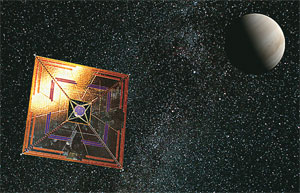- California Assembly OKs highest minimum wage in nation
- S. Korea unveils first graphic cigarette warnings
- US joins with South Korea, Japan in bid to deter North Korea
- LPGA golfer Chun In-gee finally back in action
- S. Korea won’t be top seed in final World Cup qualification round
- US men’s soccer misses 2nd straight Olympics
- US back on track in qualifying with 4-0 win over Guatemala
- High-intensity workout injuries spawn cottage industry
- CDC expands range of Zika mosquitoes into parts of Northeast
- Who knew? ‘The Walking Dead’ is helping families connect
LightSail: Carl Sagan’s Dream Realized
 A concept first envisioned by the late astronomer Carl Sagan in 1976, solar sailing is a method of propulsion through outer space that sounds like something from the imagination of a science fiction writer.
A concept first envisioned by the late astronomer Carl Sagan in 1976, solar sailing is a method of propulsion through outer space that sounds like something from the imagination of a science fiction writer.
As its name implies, solar sailing entails the use of a large reflective sail to reflect large amounts of photons-or small “packets” of light-from the sun.
While these photons do not have mass, they are high in energy and have momentum, albeit a minuscule amount per photon. When light from the sun is reflected off of the solar sail, it should theoretically transfer some of this momentum to the vehicle and accelerate it through space, extremely slowly.
Unlike a chemical fuel-based propulsion system, which accelerates the vehicle rapidly over a short period of time and then stops, a solar sail would maintain a small acceleration perpetually, eventually catching up to and theoretically even far surpassing the speed of current propulsion systems.
The Planetary Society, founded by Sagan and now led by Bill Nye (of Bill Nye the Science Guy fame), launched a Kickstarter crowd-funding project on May 12 for the LightSail spacecraft, the initial $200,000 goal of which was met in just under 24 hours.
The first iteration of LightSail, dubbed LightSail A, was launched aboard the Atlas V rocket on May 20 in the form of a CubeSat, one of many such small, customizable satellites in Atlas V’s payload.
Once in space and separated from the rocket, LightSail A’s control system will activate and begin the countdown to 28 days later, when the solar sail will deploy from several solar panels, measuring a full 8 meters across at its widest.
Made of aluminum-coated mylar, the sail will eventually function in the propulsion of some future spacecraft, but for now, LightSail A is but an experiment, to show that such a sail can open at all in space before burning up in the atmosphere due to the limited range of its CubeSat home.
Nonetheless, this one small step by the Planetary Society may be the beginning of a new era in space travel and a giant leap for mankind indeed.
 |
Johnny Choi Troy High School 11th Grade |













kelly
November 27, 2017 at 11:37 AM
yes..I like the basic concepts behind Second Life but it seems incredibly outdated and when I played it was intensely non-intuitive / user friendly to an extent that made EVE look like a game for toddlers. thanks from
togel online